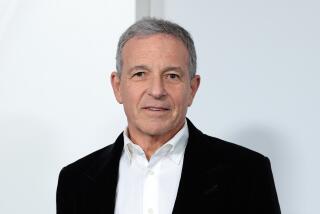Distrust Cited as Basis for Ovitz’s Firing
- Share via
GEORGETOWN, Del. — A Yale University professor testified Thursday that Walt Disney Co. directors had sufficient grounds to fire former President Michael Ovitz and deny him a hefty severance package because of his “substantial, repeated dishonesty.”
John Donohue, a specialist in employment law, told a Delaware Chancery Court that he based some of his key findings on the words of Disney Chief Executive Michael Eisner, who repeatedly raised questions about Ovitz’s veracity in court documents Donohue cited.
“Michael does not have the trust of anybody,” Eisner said in one court document read to the court. “I do not trust him.” Elsewhere, Eisner referred to Ovitz as a “psychopath” who “cannot tell the truth.”
A spokesman for Ovitz said Donohue’s statements were based on hearsay.
“When the actual facts are presented and fairly considered, they will clearly show that there was absolutely no cause to terminate Mr. Ovitz’s employment, and that he was absolutely entitled to accept the contractual benefits he received from Disney,” the spokesman said.
Donohue said he also based his conclusion on the testimony of major Disney investor Sid Bass, who in a deposition said Eisner had doubts about Ovitz’s honesty before he was hired.
Eisner’s concerns grew soon after Ovitz was hired, according to Bass. “I said you can never contain liars,” Bass said. “It’s too dangerous, you can’t do it.”
Bass said Eisner refused to fire Ovitz then because he feared it would devastate him.
Donohue is the second of three expert witnesses called by lawyers representing Disney shareholders, who allege directors failed to properly oversee the 1995 hiring and 1996 dismissal of Ovitz.
The executive eventually reaped $109 million in cash and stock options as severance. Plaintiffs argue that the package was worth $140 million the day he received it and are seeking to reclaim for Disney $200 million in payments and interest.
Attorneys for Disney directors argue that even though Ovitz failed at the job, he did not commit gross negligence or malfeasance that would have justified denying him the money.
But Donohue argued that dishonesty by a corporate officer could constitute gross negligence.
So can excessive spending, Donohue testified.
He said Ovitz repeatedly violated Disney’s policies on gifts and reimbursements. Citing a PricewaterhouseCoopers report, he said Ovitz exceeded the company’s $100 gift limit 112 times and amassed $370,000 in questionable charges -- which included flowers and pay-per-view boxing.
Ovitz’s attorney Mark Epstein said Donohue’s claims were exaggerated and misleading.
Ovitz’s gifts, for example, were not subject to a $100 limit and were approved by the company, as were his expenses, he said. Disney disputed $10,000 of Ovitz’s expenses, all of which he paid, Epstein said.
Still, Donohue said, Ovitz’s spending raised eyebrows among Disney executives.
“He was work for me,” former Disney chief counsel Sandy Litvack said in a taped deposition played in court. “I walked behind him with a shovel.”
More to Read
The biggest entertainment stories
Get our big stories about Hollywood, film, television, music, arts, culture and more right in your inbox as soon as they publish.
You may occasionally receive promotional content from the Los Angeles Times.











